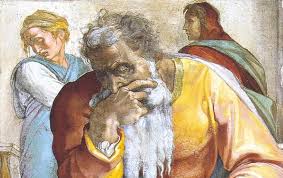The Corruption of Jerusalem
5: 1-31
During the reign of Josiah
This chapter consists of a series of indictments (5:1-5, 10-13, 20-28) followed in each case by a therefore, which introduces judgment oracles (5:6-9, 14-17, 29-31). The interlude of 5:18-19 provides the question with which the chapter, indeed the book, is primarily concerned: Why? By means of its question and answer, these verses make clear that the judgment of ADONAI is not impulsive, but has its basis in the people’s infidelity. At the same time, this interlude restates that though the whole Land will be ruined, I will not destroy it completely (4:27).68

The divine lament also finds its place in this chapter behind questions addressed to readers (5:7, 9, 22, 29, and 31). These divine questions, which interact with human comments (5:2, 4-5, 12, 19, and 24), are not simply rhetorical questions. The questions in 5:7, 9 and 29 reveal a God who has sincerely sought another outcome, but sadly, reluctantly came to the conclusion that an outcome without judgment was not possible.68 The greatest judgment YHVH can send to disobedient people is to let them have their own way and reap the sad, painful consequences of their sins.69
These questions are also genuine questions for the exiles in Babylon. From their perspective of the destruction of their homeland and the Temple, do they think that Ha’Shem had been unfair for taking this course of action? Could they think of any other avenue that the LORD might have taken? God’s question in 5:22 reveals divine wonderment at their indifferent attitude in the face of the Eternal One who created the world and provided boundaries for its destructive forces. Behind the question in 5:3 stands the One True God who asks what resources they will have available to them when the destruction falls. The mere asking of the question reveals that the God of Abraham, Isaac and Jacob was deeply concerned with their future.70



Leave A Comment